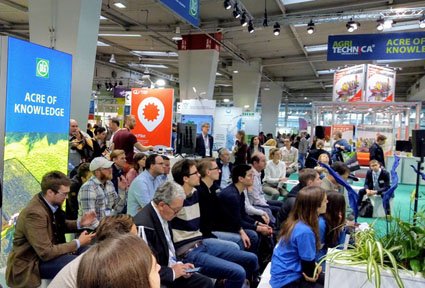- Share this article
- Subscribe to our newsletter
Development cooperation as an integral element of AGRITECHNICA 2019
AGRITECHNICA 2019 closed its doors on November 16th, 2019 after around 450,000 visitors had enjoyed this year’s international fair in Hanover. Its motto had been “Global Farming – Local Responsibility”, and this international approach was mirrored by an increased number of international visitors.
International delegations organised by the German Federal Foreign Office, Deutsche Gesellschaft für Internationale Zusammenarbeit (GIZ) GmbH and the Afrika Verein attended the fair and were invited, for instance, to the side event “Business Round Table Future Market Africa!” This Business Round Table was organised by GIZ and Agentur für Wirtschaft & Entwicklung (AWE) in cooperation with the German Agricultural Society (Deutsche Landwirtschafts-Gesellschaft DLG), the German African Business Association (Afrika Verein der deutschen Wirtschaft) and the Global Agribusiness Alliance.
Besides, DLG´s International Visitors Lounge has always been a meeting point for international guests and their conversational partners. Moreover, once again, the fair demonstrated its ability to provide a venue for exchanging ideas and experiences as well as for establishing business contacts among exhibitors and visitors from around the globe.
Innovative concepts for small-scale farming systems world-wide
One important booth in this regard was the International Special “Acre of Knowledge”, with a dedicated focus on development cooperation. DLG jointly organised this Special with GIZ and the United Nations Industrial Development Organisation (UNIDO). In total, 17 co-exhibitors from seven countries presented their products and services and used the occasion for intensive discussions with potential clients and international experts.
The products presented included some addressing soil protection, storage technologies, water preparation facilities, 3D-printers for spare parts, some in the range of E-mobility and sensor technologies for various purposes. The Food and Agriculture Organization of the United Nations (FAO) served as a technical partner for the Special by inviting co-exhibitors and supporting the Special´s Forum.
The Forum Acre of Knowledge gave the floor for 57 presenters from many countries to inform visitors about products and discuss approaches which were already in use or could potentially be used in future development cooperation. The Special´s Forum addressed at least 1,500 visitors who had chosen their topics according to their individual interests.
Presentations from the Philippines, Switzerland, Israel, Ghana and Brazil were delivered via an Internet conference call/Skype. This gave the audience the opportunity to watch the presentations on the screen and give feedback directly to the presenter abroad. This format helped diversify contributions while at the same time saving CO2-emission by reducing long-distance travels of presenters.
In general, the Special´s co-exhibitors and presenters offered information on products and services for all sizes of agricultural entities from large-scale commercial farms to smallholder farm households. Major topics discussed included what conservation agriculture looks like and how farmers can be trained in farming their land accordingly.
Especially European service providers for training courses in this regard underlined the necessity of listening to people´s needs first, before starting any training course.
Another important concern was how to manage the utilisation of scarce resources like water sustainably. Accordingly, adapted land management and irrigation systems were presented in several contributions. Two issues were unfolded as “cross-cutting” topics. First, food production was perceived in a holistic way (value chain approach) and, second, the urgent need for reducing post-harvest losses was highlighted with examples from various continents.
Around 60 time-slots of 30 minutes each were filled during the International Special´s Forum. If you are interested in the contents of the presentation, please contact the author.
Thomas König, Development Cooperation Scout from Deutsche Gesellschaft für Internationale Zusammenarbeit (GIZ) GmbH on behalf of German Federal Ministry for Economic Cooperation and Development (BMZ). Seconded to DLG e.V., Frankfurt am Main, Germany.
Contact: ez-scout(at)dlg.org





Add a comment
Be the First to Comment